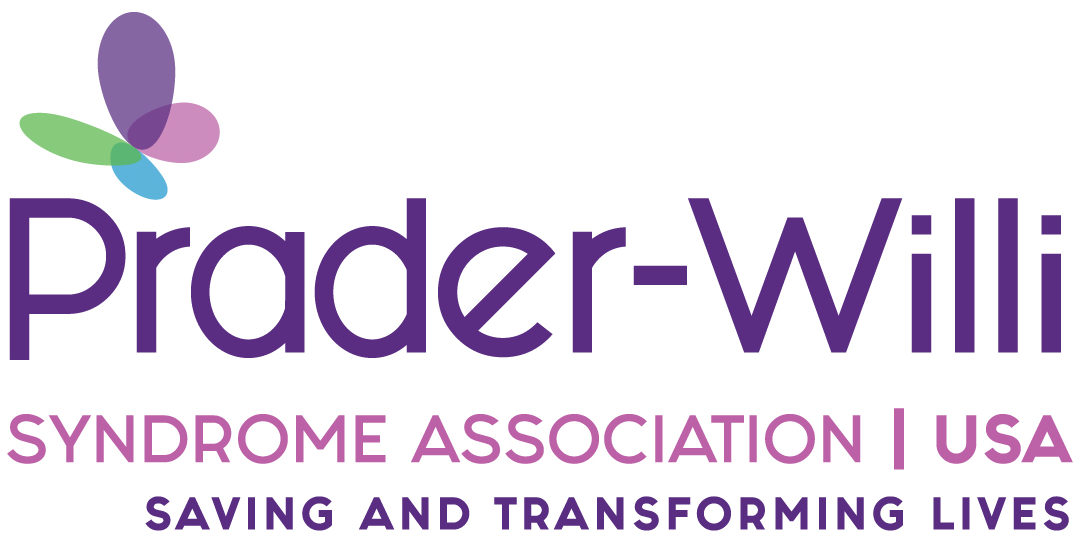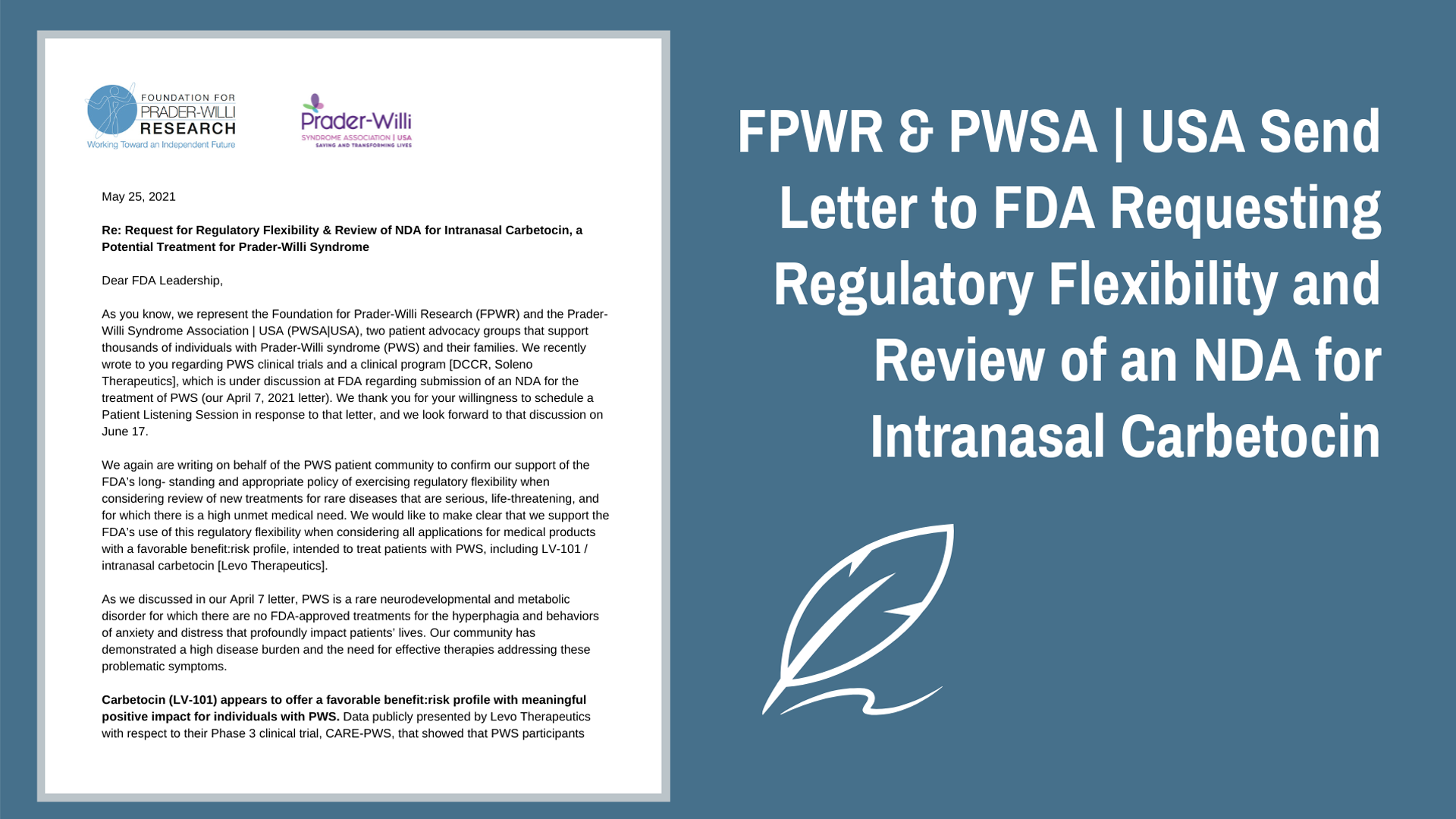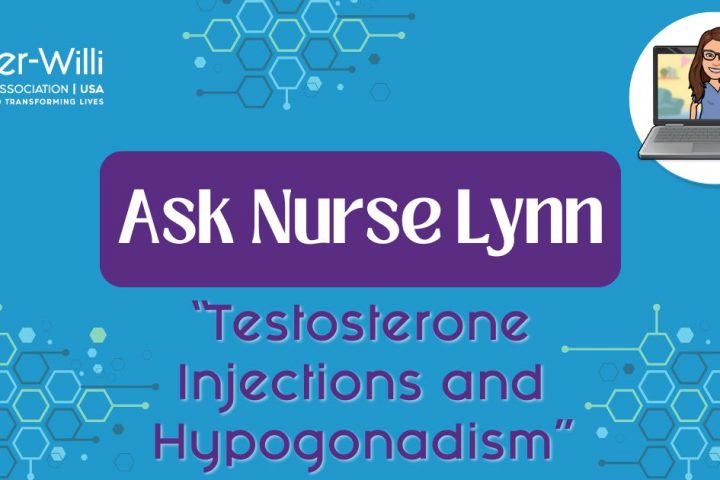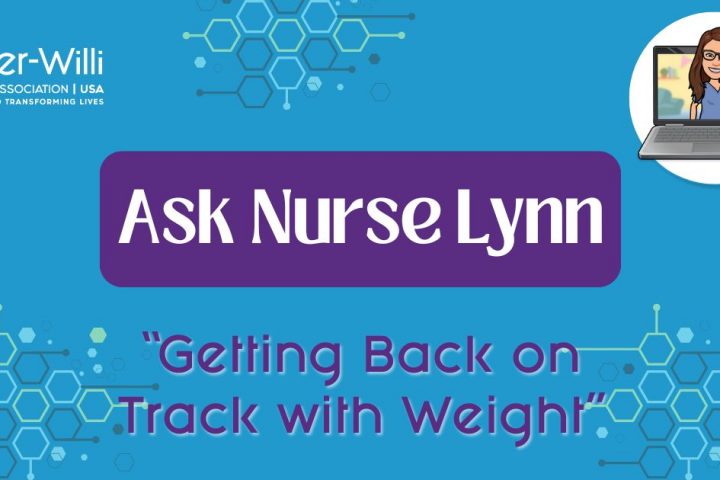We request the flexibility afforded to other orphan indications when considering whether applications for treatments for PWS should be accepted for review.
In a continuation of our joint advocacy efforts supporting the full review of potential drugs for PWS, FPWR and PWSA | USA have submitted a petition letter to the FDA requesting that they apply regulatory flexibility and review a New Drug Application for intranasal carbetocin, a potential treatment for PWS. Levo Therapeutics recently completed a Phase 3 clinical trial (CARE-PWS) evaluating the safety and efficacy of intranasal carbetocin (LV-101) in PWS.
To see the most recent abstract from the Phase 3 Study click here.
PWS is a rare neurodevelopmental and metabolic disorder and currently, there are no FDA-approved treatments for PWS-associated hyperphagia nor many of the other challenging symptoms of PWS. Given the unanticipated impact of the COVID-19 pandemic, the life-threatening nature of PWS, the tremendous unmet medical need of this rare disease, and the extreme difficulties of performing traditional clinical trials in the PWS population, we are imploring the FDA to utilize its longstanding policy of applying reasonable, science-based regulatory flexibility in its evaluation of results from PWS clinical trials. We believe it is reasonable to expect that a critical review of the intranasal carbetocin data will establish that there are real and meaningful benefits with limited risk, and a degree of uncertainty that is appropriate for our community.
Our letter to the FDA is below.
_______________________________________________________________________________________
PWS Community Letter to the FDA
May 25, 2021
Re: Request for Regulatory Flexibility & Review of NDA for Intranasal Carbetocin, a Potential Treatment for Prader-Willi Syndrome
Dear FDA Leadership,
As you know, we represent the Foundation for Prader-Willi Research (FPWR) and the Prader-Willi Syndrome Association | USA (PWSA|USA), two patient advocacy groups that support thousands of individuals with Prader-Willi syndrome (PWS) and their families. We recently wrote to you regarding PWS clinical trials and a clinical program [DCCR, Soleno Therapeutics], which is under discussion at FDA regarding submission of an NDA for the treatment of PWS (our April 7, 2021 letter). We thank you for your willingness to schedule a Patient Listening Session in response to that letter, and we look forward to that discussion on June 17. We again are writing on behalf of the PWS patient community to confirm our support of the FDA’s longstanding and appropriate policy of exercising regulatory flexibility when considering review of new treatments for rare diseases that are serious, life-threatening, and for which there is a high unmet medical need. We would like to make clear that we support the FDA’s use of this regulatory flexibility when considering all applications for medical products with a favorable benefit: risk profile, intended to treat patients with PWS, including LV-101 / intranasal carbetocin [Levo Therapeutics].
As we discussed in our April 7 letter, PWS is a rare neurodevelopmental and metabolic disorder for which there are no FDA-approved treatments for the hyperphagia and behaviors of anxiety and distress that profoundly impact patients’ lives. Our community has demonstrated a high disease burden and the need for effective therapies addressing these problematic symptoms. Carbetocin (LV-101) appears to offer a favorable benefit: risk profile with meaningful positive impact for individuals with PWS. Data publicly presented by Levo Therapeutics with respect to their Phase 3 clinical trial, CARE-PWS, showed that PWS participants receiving carbetocin had meaningful improvements in hyperphagia, as measured by a drop in HQ-CT scores. Two doses of LV-101 were included in the study. When comparing the reduction in HQ-CT scores in the carbetocin arms to placebo, the improvement seen in patients receiving 9.6 mg carbetocin were positive but did not reach statistical significance; however, improvements among patients receiving the 3.2 mg dose were significant [LS Mean Difference -3.1 (95% Confidence Interval -5.7 to -0.6), p=0.0162]. Importantly, we find it persuasive that there was consistency across endpoints, with 11 of 12 analyses (6 endpoints for each of two doses), showing improvement. Statistical significance was observed for the 3.2 mg dose in measures of hyperphagia (see above), behaviors of anxiety and distress [improvements in PADQ scores, LS Mean Difference -3.8 (95% Confidence Interval -7.2 to -0.4), p=0.0266), and in measures of clinical global impressions (improvements in CGI-Change and CGI-Severity, p=0.0266 and p=0.021). These findings are particularly compelling in light of the fact that the study was cut short due to the unprecedented effects of the COVID-19 pandemic. The data from this study are consistent with the published Phase 2 data and with what we hear anecdotally from participants in the trial and their families, who have shared the meaningful benefit that carbetocin provides to their loved ones with PWS. It is also exciting to hear that a large proportion of patients in the study continue to receive benefit in an extension period, in some cases for over two years.
While we understand that the study technically missed its primary endpoint, we believe that the impactful findings for the 3.2 mg dose are both clinically important and sufficient to warrant the FDA’s consideration. Importantly, Levo did not report any significant side effects associated with carbetocin’s chronic use in individuals with PWS. That, coupled with an extensive record of safe clinical use (following labor and delivery) suggests the risks associated with administration of carbetocin are likely to be low. Given the serious consequences of PWS, the clear and significant unmet medical need, the consistency of benefit observed across PWS studies, and the encouraging safety profile, we believe that intranasal carbetocin is likely to have a positive and meaningful impact in PWS. Thus, we urge a full FDA review and analysis of the available data to speed access to this potentially impactful treatment. We request the flexibility afforded to other orphan indications when considering whether applications for treatments for PWS should be accepted for review. We understand that the FDA has a long history of taking the specifics of a given disease into account when determining how to best establish safety and effectiveness. Since passage of the Orphan Drug Act, the FDA has used its authority to adapt to the needs of rare disease patient communities. In particular, on dozens of occasions, FDA has used its ability to interpret the substantial evidence standard as a means to afford rare disease communities the opportunity to have new treatments made available even when the data supporting that approval do not fit neatly into existing FDA-defined pathways. As a result, countless patients have benefited from the FDA’s consideration of the totality of the data in the context of the unmet medical need and distinct benefit:risk analyses that orphan drug entail. We ask that individuals with PWS be given the same flexibility that has been afforded to many other patient groups; PWS patients are no less willing to accept additional uncertainty than other patient
communities.
In FDA’s Guidance on Demonstrating Substantial Evidence of Effectiveness (Draft, December 2019), when discussing statistical considerations for treatments of rare disease, the guidance states (starting at line 667): As noted above, treatments for rare diseases often are intended to address unmet medical needs, and the considerations of balancing the harmful consequences of false positive and false negative results will often apply. In addition, the amount of evidence that can practically be acquired may be limited by the number of patients who can be recruited for trials. FDA may interpret the substantial evidence standard flexibly considering the harmful consequences of false negative and false positive results and the amount of evidence that can practically be acquired. Statistical approaches to evaluating treatments for rare diseases should consider the feasibility of trial design, sample size, and endpoints, using methods and thresholds for demonstrating substantial evidence that are appropriate to these settings.
Given our concerns regarding additional large clinical studies in our limited patient population, the impact of the COVID-19 pandemic and our willingness to accept greater risks and uncertainty of benefit, we believe the flexibility described in the guidance above should be applied to treatments for PWS (particularly when a drug appears safe), and we specifically support a full review of intranasal carbetocin.
Finally, we again thank the FDA for its willingness to meet with us in a Patient Listening Session to discuss the nuances and perspective of PWS families as it relates to unmet medical need, risk tolerance, acceptance of uncertainty of benefit, and challenges in the conduct of clinical trials. We continue to believe that such a discussion will advance the critical solutions needed for our community.
Sincerely,

John Walter, CEO Paige Rivard, CEO
Foundation for Prader-Willi Research Prader-Willi Syndrome Association | USA
Theresa Strong, PhD
Director of Research Programs
Foundation for Prader-Willi Research







 Jennifer Bolander has been serving as a Special Education Specialist for PWSA (USA) since October of 2015. She is a graduate of John Carroll University and lives in Ohio with her husband Brad and daughters Kate (17), and Sophia (13) who was born with PWS.
Jennifer Bolander has been serving as a Special Education Specialist for PWSA (USA) since October of 2015. She is a graduate of John Carroll University and lives in Ohio with her husband Brad and daughters Kate (17), and Sophia (13) who was born with PWS. Perry A. Zirkel has written more than 1,500 publications on various aspects of school law, with an emphasis on legal issues in special education. He writes a regular column for NAESP’s Principal magazine and NASP’s Communiqué newsletter, and he did so previously for Phi Delta Kappan and Teaching Exceptional Children.
Perry A. Zirkel has written more than 1,500 publications on various aspects of school law, with an emphasis on legal issues in special education. He writes a regular column for NAESP’s Principal magazine and NASP’s Communiqué newsletter, and he did so previously for Phi Delta Kappan and Teaching Exceptional Children. Evan has worked with the Prader-Willi Syndrome Association (USA) since 2007 primarily as a Crisis Intervention and Family Support Counselor. Evans works with parents and schools to foster strong collaborative relationships and appropriate educational environments for students with PWS.
Evan has worked with the Prader-Willi Syndrome Association (USA) since 2007 primarily as a Crisis Intervention and Family Support Counselor. Evans works with parents and schools to foster strong collaborative relationships and appropriate educational environments for students with PWS. Dr. Amy McTighe is the PWS Program Manager and Inpatient Teacher at the Center for Prader-Willi Syndrome at the Children’s Institute of Pittsburgh. She graduated from Duquesne University receiving her Bachelor’s and Master’s degree in Education with a focus on elementary education, special education, and language arts.
Dr. Amy McTighe is the PWS Program Manager and Inpatient Teacher at the Center for Prader-Willi Syndrome at the Children’s Institute of Pittsburgh. She graduated from Duquesne University receiving her Bachelor’s and Master’s degree in Education with a focus on elementary education, special education, and language arts. Staci Zimmerman works for Prader-Willi Syndrome Association of Colorado as an Individualized Education Program (IEP) consultant. Staci collaborates with the PWS multi-disciplinary clinic at the Children’s Hospital in Denver supporting families and school districts around the United States with their child’s Individual Educational Plan.
Staci Zimmerman works for Prader-Willi Syndrome Association of Colorado as an Individualized Education Program (IEP) consultant. Staci collaborates with the PWS multi-disciplinary clinic at the Children’s Hospital in Denver supporting families and school districts around the United States with their child’s Individual Educational Plan. Founded in 2001, SDLC is a non-profit legal services organization dedicated to protecting and advancing the legal rights of people with disabilities throughout the South. It partners with the Southern Poverty Law Center, Protection and Advocacy (P&A) programs, Legal Services Corporations (LSC) and disability organizations on major, systemic disability rights issues involving the Individuals with Disabilities Education Act (IDEA), Americans with Disabilities Act (ADA), and the federal Medicaid Act. Recently in November 2014, Jim retired.
Founded in 2001, SDLC is a non-profit legal services organization dedicated to protecting and advancing the legal rights of people with disabilities throughout the South. It partners with the Southern Poverty Law Center, Protection and Advocacy (P&A) programs, Legal Services Corporations (LSC) and disability organizations on major, systemic disability rights issues involving the Individuals with Disabilities Education Act (IDEA), Americans with Disabilities Act (ADA), and the federal Medicaid Act. Recently in November 2014, Jim retired.